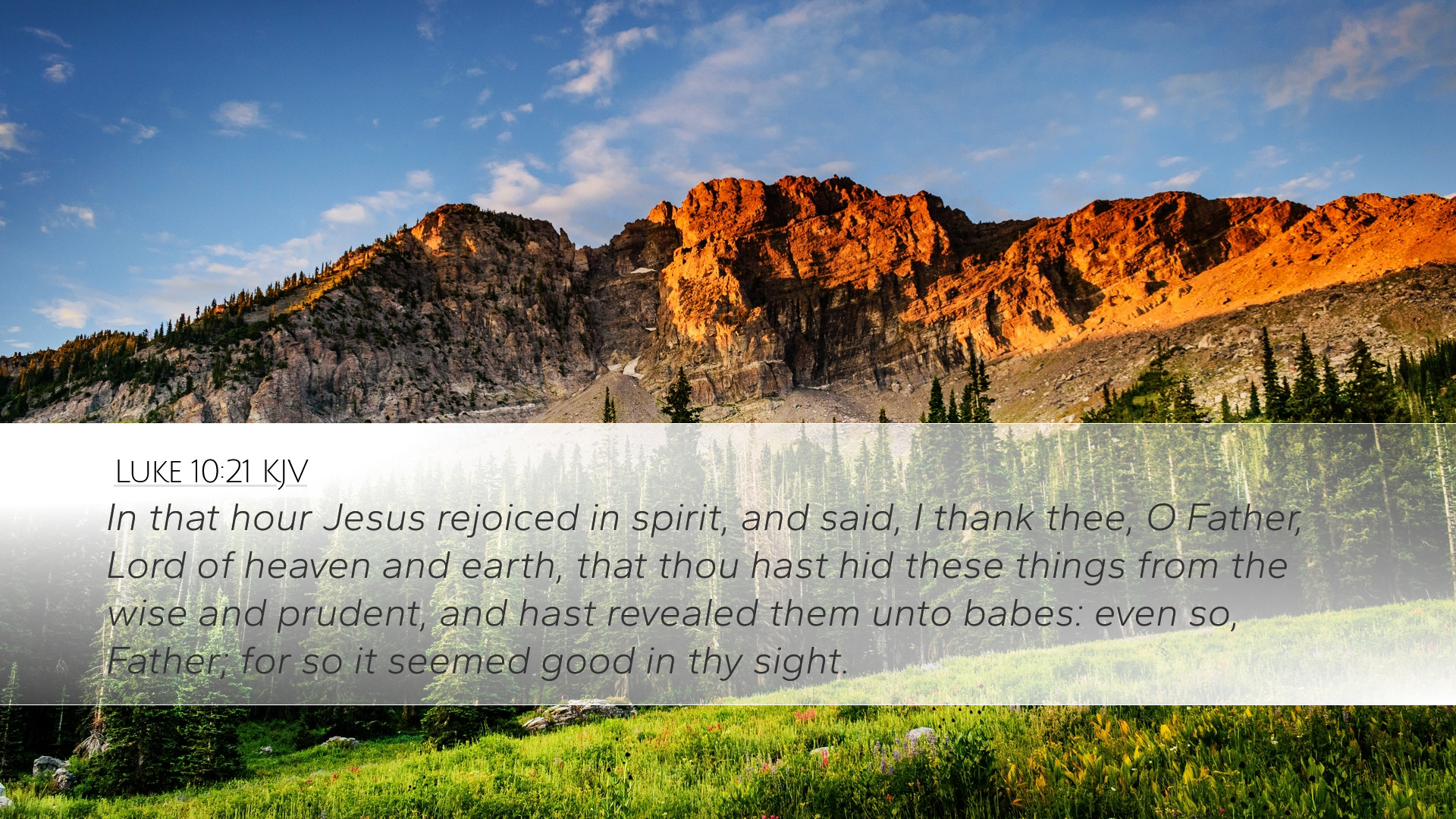Commentary on Luke 10:21
Luke 10:21 states: "In that hour Jesus rejoiced in spirit, and said, I thank thee, O Father, Lord of heaven and earth, that thou hast hid these things from the wise and prudent, and hast revealed them unto babes: even so, Father; for so it seemed good in thy sight."
Overview
This verse captures a profound moment in Jesus’ ministry where He expresses joy and gratitude towards the Father for the revelation of divine truths to those considered lowly or childlike, contrasting them with the wise and prudent. This sentiment highlights a critical aspect of Jesus’ teaching about the kingdom of God and invites deeper reflection on humility, revelation, and divine will.
Insights from Matthew Henry
Matthew Henry emphasizes the following key themes in this verse:
- Joy of the Savior: Henry reflects on the idea that Jesus rejoices not merely as a human would but with a divine spirit. His joy stems from observing the fulfillment of God's plan for revealing truth to the humble.
- Revelation to the Lowly: The contrast between the wise and the babes is significant. Henry interprets the 'wise' as those who trust in their own understanding, while 'babes' represent those who approach God with simplicity and trust, open to revelation.
- Divine Sovereignty: In thanking the Father, Jesus acknowledges that it is by divine choice that the secrets of the kingdom are revealed. This acts as a reminder of God's sovereignty over human wisdom and understanding.
Insights from Albert Barnes
Albert Barnes provides a detailed examination of the implications within this passage:
- Jesus’ Emotional Response: Barnes notes that the phrase "rejoiced in spirit" indicates profound emotional engagement. It suggests an alignment of Jesus’ human experience with the divine happiness of accomplishing God's will.
- Contrast Between Groups: He elaborates on the difference between the wise and the babes, interpreting the 'wise' as those experts in law and religion, while 'babes' symbolize those who, due to a lack of pretense and arrogance, are more receptive to spiritual truths.
- Revelation vs. Human Wisdom: Barnes remarks that this sentiment underscores a biblical theme: God's truth often shuns human intellect, as demonstrated throughout Scripture, enhancing the need for humility in our pursuit of knowledge.
Insights from Adam Clarke
Adam Clarke offers a systematic theological perspective on the themes in this scripture:
- Nature of True Knowledge: Clarke points out that true knowledge of God’s kingdom is not necessarily a product of academic scholarship but is granted to those whose hearts are in a posture of submission and childlike faith.
- The Importance of Humility: He highlights that Jesus' statement reminds believers of the necessity of humility and simplicity in seeking God, challenging the cultural inclination to esteem scholarly accomplishment over genuine faith.
- God's Discretion in Revelation: Clarke emphasizes the sovereignty of God in the way He dispenses understanding, stating that God reveals Himself to those He chooses—a profound truth that encourages deep reliance on God over self-sufficiency.
Theological Reflections
This passage invites a rich exploration of several theological themes:
- Humility Before God: The verse beckons believers to embrace a stance of humility, recognizing that God’s ways often transcend human wisdom.
- The Nature of Divine Revelation: This highlights a key aspect of Christian belief: spiritual enlightenment or understanding is a gift from God, accessible to those who are willing to accept it with a child-like openness.
- Joy in Faith: Jesus’ rejoicing draws attention to the joy inherent in faith, suggesting that an authentic relationship with God leads to genuine happiness and fulfillment.
Application for Pastors and Theologians
For pastors, theologians, and students, this passage offers several practical applications:
- Encourage Openness: Challenge congregants to approach their spiritual journeys with humility and openness to God’s revelations, much like a child.
- Teach on the Value of Humility: Highlight the importance of humility in preaching and teaching, ensuring that wisdom does not become a barrier to understanding spiritual truths.
- Foster Joy in Ministry: Model and encourage a joyful spirit in ministry, emphasizing the importance of rejoicing in the work one does for the Kingdom.
Conclusion
Luke 10:21 serves as a profound reminder of the nature of God’s revelation and the attitude required to receive it. Jesus’ profound joy and gratitude for the Father’s wisdom challenge our worldly views on knowledge and power. Through this passage, we are encouraged to cultivate humility, embrace child-like faith, and find joy in our relationship with God, recognizing that the greatest truths of the kingdom are often hidden from the prideful and revealed to the lowly.


